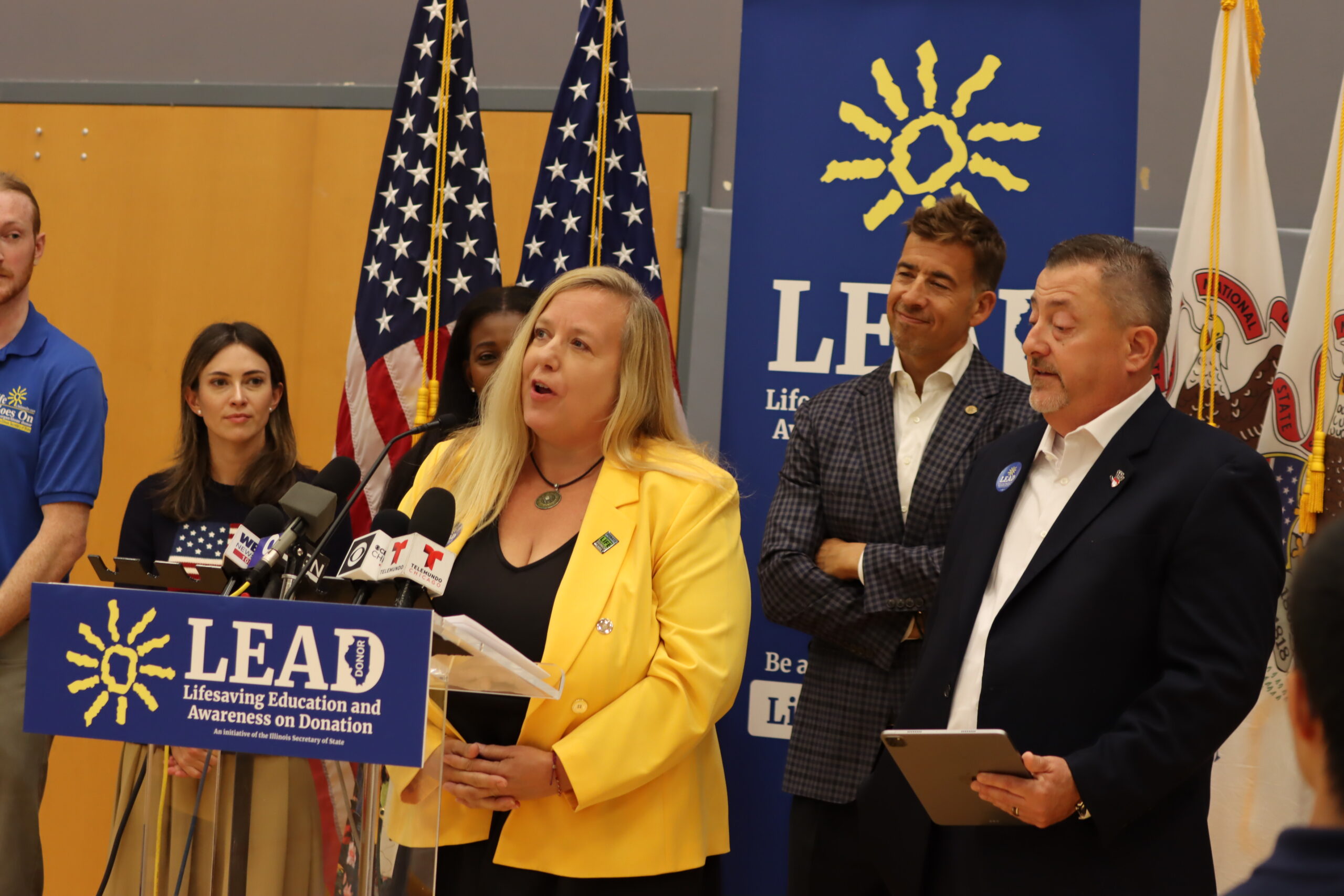Grobmeier speaking at the LEAD event Cyndi Grobmeier
Communications Professor and founder of Students for H.O.P.E. at Saint Xavier University, Cyndi Grobmeier PhD, was recently invited to a press conference hosted by the Illinois Secretary of State’s office to discuss the implementation of incorporating organ and tissue donation programs into the education system.
Grobmeier founded the Maddog Strong Foundation in 2019, following the death of her daughter Maddie, who had requested to be an organ donor shortly before she died in the same year. As dedication and support of her daughter’s wishes, Grobmeier has made it a mission to educate the public on the crucial importance of organ and tissue donation in hopes of being able to save as many lives as possible through their programs in Maddy’s honor.
The Maddog Strong Foundation has been building a program called “Teach Life” since 2020, which aims to create a curriculum for teachers to implement organ and tissue donation education in their classrooms by providing materials such as educational documentaries, classroom activities, powerpoint presentations, quizzes, assessments, and web quest activities, says Grobmeier.
“We were able to share our story of how we began to be involved in this space, Frank [Grobmeier’s husband] talked about specifically our daughter, Maddy and how she was a teen donor,” Grobmeier mentions. “I think that was an important connection to make particularly for the students of Walter Payton College Prep High School who were in attendance to see the real-world, personal connection.”
During the conference, the Secretary of State’s office announced the establishment of their program, LEAD Youth Service Learning-Program to train peer leaders in high school systems to advocate for organ and tissue donation. Peer leaders will learn leadership skills through these roles, while receiving service hour credit.
“It’s giving peer leaders the opportunity to educate and inspire their own peers,” says Grobmeier. “They [students] are going to listen to their peers before they are going to listen to someone like me, so that’s going to be super innovative and should be a really, really effective program.”
Dan Lietz, program manager of Life Goes On, which is part of the Secretary of State, took notice of these materials being provided and wanted to incorporate them into the LEAD program to aid in training of their peer leaders. This led to the involvement of Grobmeier speaking at the conference to advocate on the focus of these causes.
Training peer leaders have already begun in session, as around 80 schools have already shown interest in participating in the program into their students’ education.
Upon Grobmeier meeting the Secretary of State, Alexi Giannoulias, she revealed, “he [Giannoulias] seemed really passionate about this program and what we’re trying to do. I really appreciated that a politician who’s that high in the state demonstrated that he’s personally and professionally connected and favoring this program.”
Grobmeier has noticed an impact made on younger generations, as she’s beginning to see real change within those communities, she says. Educating on important topics such as these will allow the stigmas of organ donation to no longer be a fear or exist.
“I think that by educating young people about this topic, this generation is going to be the generation that finally puts a lot of the myths and misconceptions to rest,” says Grobmeier. “Our goal is to inspire the next generation of organ and tissue advocates, we believe we do that through education, so a program like this means everything.”
Conversations surrounding organ donations will become less of a stigma, as more open discussions will be had, not just at speeches, but including at dinner tables and reshaping those perspectives and views of older generations on the matter, says Grobmeier.
Communication is absolutely significant when trying to advocate and spread awareness on a critical issue. Becoming more vocal with those willing to listen can not only change the lives you’ve impacted through your activism, but help others understand the reasons for doing so.
“The ability to reach a broader audience at any time with a message is so important for advocacy for non-profit and various causes, ” explains Grobmeier. “Without that, people who are not personally connected to that cause are not going to have any awareness of it, so the importance of it is just so profound.”
If you are interested in joining the Maddog Strong Foundation, Teach Life, or LEAD programs, please visit their website in the links provided.

